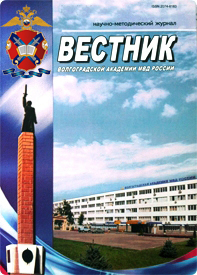Volgograd, Russian Federation
In a democratic state everyone is equal before the law and, therefore, assumes equal responsibility for disregard for the rule of law. In a general sense, the connection of the rule of law with democracy implies that laws themselves and the necessity to comply with them express the will of most of the people. Thus, the law enforcement is implemented under the people’s control. In theory certain categories of the rule of law are distinguished. Within these categories there are various definitions of this phenomenon. Grounds of legal and non-legal nature, governmental and general social content are closely intertwined. Interests of different groups, strata, citizens, and society interact. The rule of law is considered as the basis for the proper functioning of a state, all its elements and entities. The supreme value of the modern Russian state is a human being and his rights and freedoms the observance of which is provided by the concept of human rights policy. It exerts influence on the national projects, the policy of innovative development of Russia that is determined by the decisions of higher bodies of state authority, the current legislation, and different ways of implementation and protection of citizens’ rights and freedoms. Even now, with certain reservations, one can discuss the rule of law in a material and procedural sense. The material rule of law implies a set of ideas, rules and goals of existence of certain regulatory legal acts fulfilling a protective or regulatory function. Such rule of law is of static character. The procedural rule of law is an activity of institutes of state authority, special entities, citizens, and non-governmental organizations within the legal framework of implementing the goals to build a legal state.
rule of law, democracy, protection of rights and freedoms, human rights policy, civil society, institutes of state authority, principles of state bodies’ activity, legal state
1. Marks K., Engel's F. Sochineniya. M., 1962. S. 84.
2. Ponomarev D. A. Teoreticheskie problemy razvitiya ponyatiya zakonnosti v otechestvennoy yuridicheskoy nauke: avtoref. dis. … kand. yurid. nauk. Ufa, 2002. S. 11.
3. Zakonnost' v Rossiyskoy Federacii. M., 2008. S. 19.
4. Vitruk N. V. Zakonnost': ponyatie, zaschita i obespechenie. Konstitucionnaya zakonnost' i konstitucionnoe pravosudie // Obschaya teoriya gosudarstva i prava / pod red. M. N. Marchenko. M., 1998. S. 15.
5. Kudryavcev V. N. Zakonnost': soderzhanie i sovremennoe sostoyanie // Zakonnost' v RF. M., 1998. S. 4.
6. Aleksandrov N. G. Pravo i zakonnost' v period razvernutogo stroitel'stva kommunizma. M., 1981. S. 106.
7. O sobraniyah, mitingah, demonstraciyah, shestviyah i piketirovaniyah [Elektronnyy resurs]: feder. zakon RF ot 19 iyunya 2004 g. № 54-FZ. Dostup iz sprav.-pravovoy sistemy «Konsul'tantPlyus».
8. Lisyutkin A. B. K ponyatiyu zakonnosti // Pravovedenie. 1993. № 5. S. 10.
9. Korel'skiy V. M. Vse nachinaetsya s discipliny. M., 1985. S. 35.
10. Levchenko I. P. Primenenie prava kak sistema gosudarstvenno-vlastnoy deyatel'nosti: avtoref. dis. … kand. yurid. nauk. M., 1986. S. 6.
11. Alekseev S. S. Voshozhdenie k pravu. Poiski i resheniya. M., 2001. S. 481.
12. Nersesyanc B. C. Filosofiya prava. M., 2003. S. 103.
13. Gaag L. V. Zakonnost' kak princip deyatel'nosti organov ispolnitel'noy vlasti sub'ektov Rossiyskoy Federacii: po materialam Zapadnoy Sibiri: avtoref. dis. … kand. yurid. nauk. Tomsk, 1998. S. 23.









